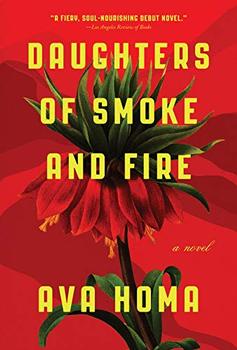Book Club Discussion Questions
In a book club? Subscribe to our Book Club Newsletter!
For supplemental discussion material see our Beyond the Book article, Kurdish Women Fight for Freedom and our BookBrowse Review of Daughters of Smoke and Fire.
Please be aware that this discussion guide will contain spoilers!
- Traveling through books is a rewarding experience —
inexpensive, convenient, and heart-opening.
Daughters of Smoke and Fire takes you to
Kurdistan, Iran, Iraq, and Canada. How was your
experience following characters across the globe?
- Readers often like to see what they have in common with people in various parts of the world.
Did you see parts of yourself reflected back to you in Daughters of Smoke and Fire? What were
they? Did you relate to one character more than others? Who were they and what made that
character most relatable?
- Daughters of Smoke and Fire opens a window into the challenging lives of a stateless people
who have been robbed of their right to live, or to live in peace. It's a difficult novel to write and
to read. Why is it important for us to read untold stories? What did you gain from reading this
novel in particular?
- Which character in Daughters of Smoke and Fire would you like to speak to and what would
you say to them? What would you say to Leila if you ran into her at a café?
- Has this book changed anything about how you see immigrants? Will reading this book make you more aware of xenophobia and rethink how you confront it in your community?
- How does Daughters of Smoke and Fire compare with other novels that discuss the struggles
and triumphs of Middle Eastern people?
- What did you learn about Kurdish culture through this book that you found interesting? Are there
any new foods you'd like to try? New music? Would you like to read Sherko Bekas's poetry?
- Leila says, "It's not only our homeland that's colonized. Our self-worth is hijacked too. Tyranny
can stimulate unwitting self-sabotage. Our self-worth is hijacked. Pain needs to be managed—
perhaps, in a sense, outsourced" (page 296). What do these sentences mean to you?
- What do you think about how mainstream media often distorts the image of underrepresented
groups? How is that destructive to not one group of people but to humanity as a whole? What do
you think needs to change in our media to stop valuing some lives over others?
- Leila thinks the world needs to stop looking down upon or, on the contrary, romanticizing and
fetishizing Kurds and instead should accept them as a nation with strengths and weaknesses,
just like any other group of humans. What does she mean by that and how can you as a reader
make that shift within yourself?
- If Daughters of Smoke and Fire were made into a movie, which actor should play the role of
Leila? Chia? Shiler? Karo?
- Are there specific people to whom you'd recommend this book? Who would enjoy reading it,
and who should read it?
Unless otherwise stated, this discussion guide is reprinted with the permission of The Overlook Press.
Any page references refer to a USA edition of the book, usually the trade paperback version, and may vary in other editions.
